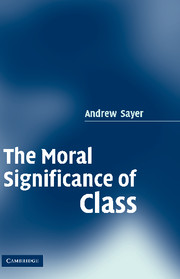Book contents
- Frontmatter
- Contents
- Preface and acknowledgements
- 1 Introduction
- 2 From the habitus to ethical dispositions
- 3 Recognition and distribution
- 4 Concepts of class: clearing the ground
- 5 Struggles of the social field
- 6 Moral and immoral sentiments and class
- 7 Responses to class I: egalitarianism, respect(ability), class pride and moral boundary drawing
- 8 Responses to class II: explanations, justifications and embarrassment
- 9 Conclusions and implications
- Bibliography
- Index
3 - Recognition and distribution
Published online by Cambridge University Press: 22 September 2009
- Frontmatter
- Contents
- Preface and acknowledgements
- 1 Introduction
- 2 From the habitus to ethical dispositions
- 3 Recognition and distribution
- 4 Concepts of class: clearing the ground
- 5 Struggles of the social field
- 6 Moral and immoral sentiments and class
- 7 Responses to class I: egalitarianism, respect(ability), class pride and moral boundary drawing
- 8 Responses to class II: explanations, justifications and embarrassment
- 9 Conclusions and implications
- Bibliography
- Index
Summary
Introduction
As many commentators have noted (e.g., Fraser, 1995; Honneth, 2001; Phillips, 1999), until the 1980s, equality in terms of distribution was seen as central to political philosophy and radical politics, whether under the banner of Rawls and other social democratic positions or various kinds of Marxism, whereas since then, the avoidance of exclusion and disrespect has in many cases overtaken inequality as a priority. Repeated refusal of recognition to an individual can produce serious psychological damage and refusal of recognition to a group also damages its well-being and ability to function in wider society (Taylor, 1994). As Nancy Fraser puts it, it prevents people ‘participating on a par with others in social interaction’ (Fraser, 1999, p. 34). Many oppressive social relations such as those of racism and homophobia involve systematic misrecognition – part refusal of recognition and part stigmatised recognition. While this shift from distribution to recognition has been progressive in highlighting hitherto ignored forms of oppression, some observers have regretted the fact that it seems to have been coupled with an abandonment of concern for class politics, which have been associated with the politics of distribution (Phillips, 1999). The retreat from class was not merely illogical but decidedly untimely, for it coincided with the rise of attempts by neoliberals to legitimise class inequalities.
The most prominent kinds of recognition claims in contemporary politics have been ones relating to cultural difference, including differences in sexuality, religion and lifestyle.
- Type
- Chapter
- Information
- The Moral Significance of Class , pp. 52 - 69Publisher: Cambridge University PressPrint publication year: 2005



